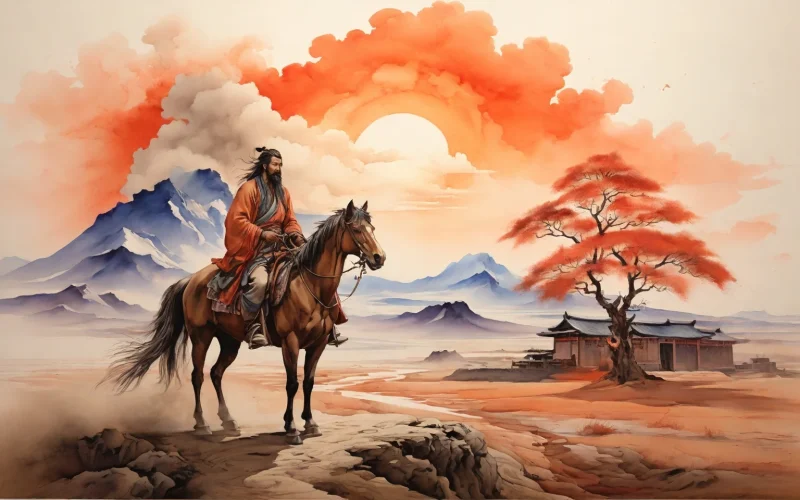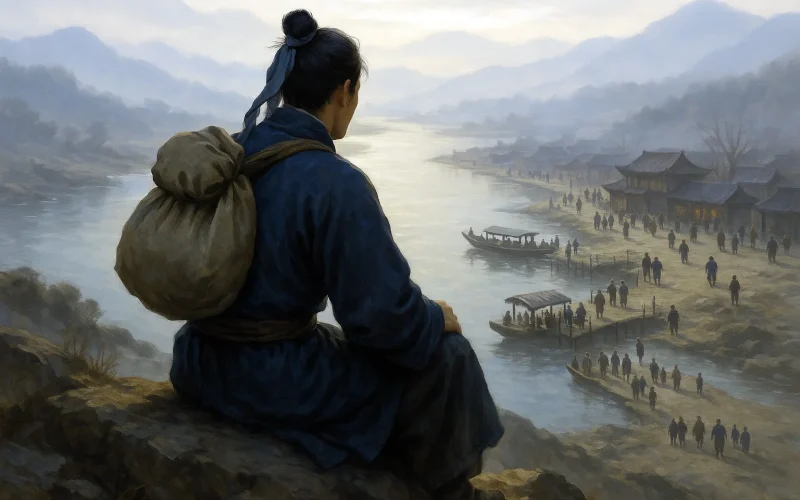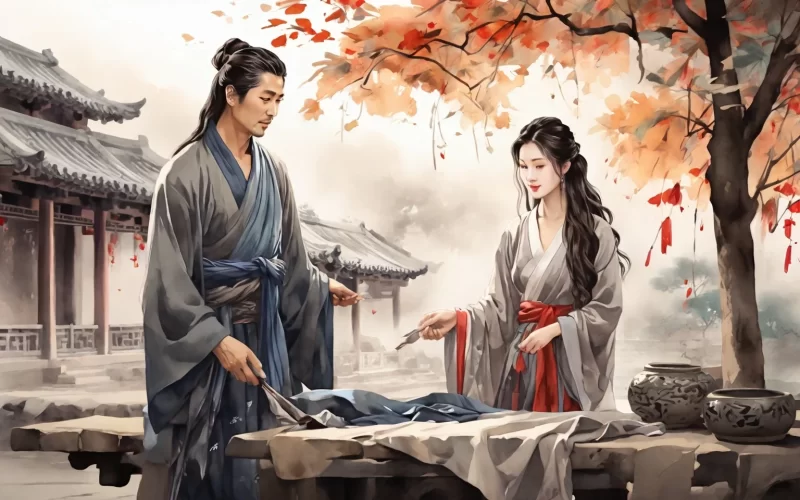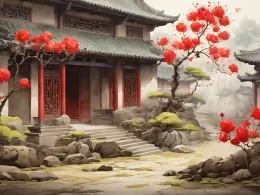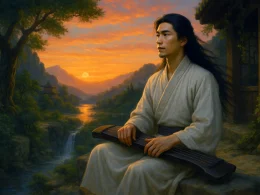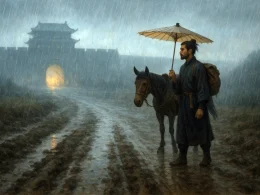Fiery Mountain in sixth moon hotter than before,
No people pass by Red Pavilion any more.
I know you're used to hardship on the west frontier;
Oh, could the moon over Wheel Tower make you drear?
Unsaddle your horse, drink and drown in wine your woe;
I'll see you go for miles and miles to beat the foe.
You will win rank and fame only on battle steed;
A real hero must have done heroic deed.
Original Poem
「送李副使赴碛西官军」
岑参
火山六月应更热,赤亭道口行人绝。
知君惯度祁连城,岂能愁见轮台月。
脱鞍暂入酒家垆,送君万里西击胡。
功名祗向马上取,真是英雄一丈夫。
Interpretation
This poem was composed during the Tianbao era of Emperor Xuanzong of Tang, specifically during Cén Cān's tenure on the staff of either the Anxi or Beiting Protectorate. Vice-Magistrate Li (whose given name is unknown) was likely a colleague or friend of Cén Cān, dispatched on official business or military campaign to "Qixi" (a general term for lands west of the Western Regions' deserts). Unlike typical farewells in the Central Plains, this parting occurs at the frontier's edge, with the destination being a place even more remote and arduous than their current station deep in the Western Regions. This specific context dictates the poem's fundamental difference from traditional, sentimentally sorrowful farewell poetry. It must directly confront and transcend the hardships of the frontier itself, thereby elevating the farewell into a celebration of heroic spirit and a mutual affirmation of the belief in achieving merit and glory. It stands as a paradigm of the "heroic farewell" subgenre within High Tang frontier poetry.
Cén Cān's own experience of twice venturing beyond the frontier and his prolonged immersion in border life allowed him to move beyond mere description or fear of its hardships. Instead, he conveys a sense of familiarity, pride, and even an aestheticized desire to conquer these landscapes. Thus, in this poem, images like the Flaming Mountains, Red Pavilion, Qilian Mountains, and Lun Tai are not forbidding symbols of bitter cold but become the vast, heroic stage that tempers heroes and witnesses their fame. This is not merely bidding farewell to a friend; it is a concentrated expression of Cán Cān's own frontier values and heroic ethos.
First Couplet: "火山六月应更热,赤亭道口行人绝。"
Huǒshān liù yuè yīng gèng rè, Chìtíng dàokǒu xíngrén jué.
The Flaming Mountains in the sixth moon must be hotter still; / At the mouth of the Red Pavilion road, all travelers have vanished.
The opening bypasses sentimental farewell tropes, striking directly at the extreme environment the friend will face. "Huǒshān" (Flaming Mountains, in modern-day Turpan, Xinjiang) and "Chìtíng" (a key frontier pass) pinpoint the location, using geographical extremity to imply the journey's peril. "Must be hotter still" is conjecture, brimming with empathy for the road ahead; "all travelers have vanished" is stark reality, emphasizing the route's utter desolation. These lines, with their matter-of-fact, undeniable objectivity, construct a harsh backdrop daunting to ordinary people, precisely to set in relief the extraordinary nature of the protagonist introduced next.
Second Couplet: "知君惯度祁连城,岂能愁见轮台月。"
Zhī jūn guàn dù Qílián chéng, qǐ néng chóu jiàn Lúntái yuè.
Well I know you're accustomed to crossing Qilian's garrison towns; / How could you grieve to see the moon o'er lonely Lun Tai?
The poet's brush turns, shifting from environmental trial to praise for the friend's spirit. "Accustomed to crossing Qilian's garrison towns" establishes Vice-Magistrate Li as a seasoned veteran, for whom hardship is routine. "How could you grieve…" uses a rhetorical question, its tone resolute. This expresses boundless trust in the friend and pays sublime tribute to his iron will and professional fortitude. The moon over Lun Tai is a classic frontier poetry motif for homesickness. Here, its associated melancholy is utterly negated, signifying the establishment of a frontier defender's persona that transcends personal sentiment.
Third Couplet: "脱鞍暂入酒家垆,送君万里西击胡。"
Tuō ān zàn rù jiǔjiā lú, sòng jūn wàn lǐ xī jī hú.
Dismount, unsaddle, and step awhile into this wineshop here; / I send you off ten thousand *li* west, to smite the Hu.
This couplet brings the focus back to the immediate farewell scene, yet without a trace of triviality. The action "Dismount, unsaddle" is crisp and decisive, full of military directness. The "wineshop" is a common place for a parting drink, but the seven characters "to smite the Hu ten thousand li west" instantly connect this humble tavern to a march of ten thousand miles and a national mission, vastly expanding the poem's scope. A simple cup of wine carries the soaring spirit and heavy responsibility of defending the realm. Within the plain narrative resonates a metallic, heroic clang.
Fourth Couplet: "功名祗向马上取,真是英雄一丈夫。"
Gōngmíng zhǐ xiàng mǎ shàng qǔ, zhēn shì yīngxióng yī zhàngfū.
True merit and fame are won only from the saddle's seat! / You are indeed a hero, a man of stature, complete!
The final couplet is the poem's zenith and the poet's direct declaration of values. "True merit and fame are won only from the saddle's seat!" states categorically, clarifying the proper source of achievement—at the frontier, on the battlefield. This is both an expectation for the friend and the shared creed of countless High Tang frontier aspirants. It concludes with the admiring exclamation, "You are indeed a hero, a man of stature, complete!" No longer relying on indirect imagery, the poet speaks from the heart, filled with heartfelt admiration and acclaim, like a resounding verdict and a clarion call for the journey.
Holistic Appreciation
This heptasyllabic ancient poem is brief in length but grand in spirit, a potent and unrestrained expression of the High Tang frontier ethos. The poem tightly focuses on the twin cores of "farewell" and "departure for war," yet achieves a complete overturning of traditional farewell sentiment.
The poem's emotional logic is clear and powerful: the first couplet emphasizes the "harshness" (extreme environment), the second praises the "capability" (accustomed to the frontier), the third narrates the "act" (a quick drink before parting), and the final couplet acclaims the "aspiration" (seeking fame from the saddle). In this chain, the "hardship" of the environment is not a burden but a necessary foil and contrast to highlight the subject's "capability" and "aspiration." The poet discards all elaboration of sorrowful parting sentiment. Instead, using a tone full of understanding and trust, he and his friend mutually affirm the value and glory of this distant mission. This approach transforms the farewell from a one-sided expression of sadness or well-wishing into a summit dialogue between two kindred spirits concerning belief and duty, charged with positive, active force.
The poem's language is simple, robust, almost vernacular, yet possesses an undeniable heroic vigor. The dense listing of place names—Flaming Mountains, Red Pavilion, Qilian, Lun Tai—not only sketches a clear geographical depth but also constructs a vast, challenging, opportunity-filled space belonging to heroes alone. Here, Cén Cān demonstrates that the most sublime heroic sentiment often needs no ornate phrasing, only the most straightforward language to express the firmest belief.
Artistic Merits
- Central Use of Contrast: The poem's artistic power lies in its potent contrasts. The extreme environment of the "Flaming Mountains' heat" and "vanished travelers" contrasts with the ease of being "accustomed to crossing Qilian." The traditional melancholy of the "moon o'er Lun Tai" contrasts with the heroism of "how could you grieve." The commonplace scene of the "wineshop" contrasts with the grandeur of "ten thousand li west, to smite the Hu." The more the hardship and the ordinary are emphasized, the more the subject's exceptional nature and lofty aspirations are highlighted.
- Direct Characterization: Unlike traditional farewell poems focusing on the speaker's emotions, this poem's focus remains fixed on the traveler, Vice-Magistrate Li. Through the indirect appraisal of "well I know you're accustomed…" and "how could you grieve…", the action sketch of "dismount, unsaddle," and the definition of value in "merit and fame… from the saddle's seat," the poem progressively sculpts the vivid image of a heroic warrior—undaunted by hardship, intent on achievement, direct and magnanimous—as clearly as if carved.
- Active Control of Emotional Tone: The poet firmly controls the emotional direction, deliberately avoiding any imagery that might evoke sadness or worry (like willow branches, tearful eyes). Even mentioning the "moon o'er Lun Tai" is immediately negated by a rhetorical question. This "filtering" and "purifying" of parting emotions maintains the poem's consistently uplifting, impassioned tone throughout, pioneering a wholly new realm for farewell poetry.
- Forceful, Direct Declaration of Values: "True merit and fame are won only from the saddle's seat! / You are indeed a hero, a man of stature, complete!" This is both the poetic core and one of the most representative value declarations in High Tang frontier poetry. It is not subtle but direct, achieving a proverbial, shocking effect through its purity of conviction and force of expression, becoming the ultimate destination of the poem's emotion and thought.
Insights
This poem is like a mirror tempered by fire, reflecting the High Tang era's spirit—one that esteemed practical achievement, praised courage and strength, and sought the utmost of life within vast horizons. It teaches us that a true farewell need not be tears and sighs, but can be understanding, recognition, and an impassioned send-off. When a friend departs for a lofty mission and an ideal campaign, the deepest affection transforms into the firmest trust and the most ardent encouragement.
Its deeper revelation lies in its meditation on the relationship between "value" and "environment." In the eyes of ordinary people, the Flaming Mountains and desolate regions signify suffering and exclusion. But in the hearts of aspirants like Cén Cān and Vice-Magistrate Li, they are the necessary stage and touchstone for achieving the status of "a hero, a man of stature." This poem challenges our conventional understanding of comfort versus success, safety versus value. It reminds us that the greatest achievements and the most solid reputations are often forged in the most arduous tempering.
Ultimately, with its utterly cloudless heroic spirit, this poem offers us a kind of spiritual tempering: Facing life's "ten thousand li" journeys and "Flaming Mountains"-like challenges, can we possess the ease of being "accustomed to crossing Qilian," uphold the belief that "merit and fame are won only from the saddle," and ultimately become the "hero" and "man of stature" in our own lives? Cén Cān's poem is precisely an eternal, heroic march played for all souls advancing through difficulty, seeking meaning within challenge.
Poem translator
Xu Yuanchong (许渊冲)
About the poet:
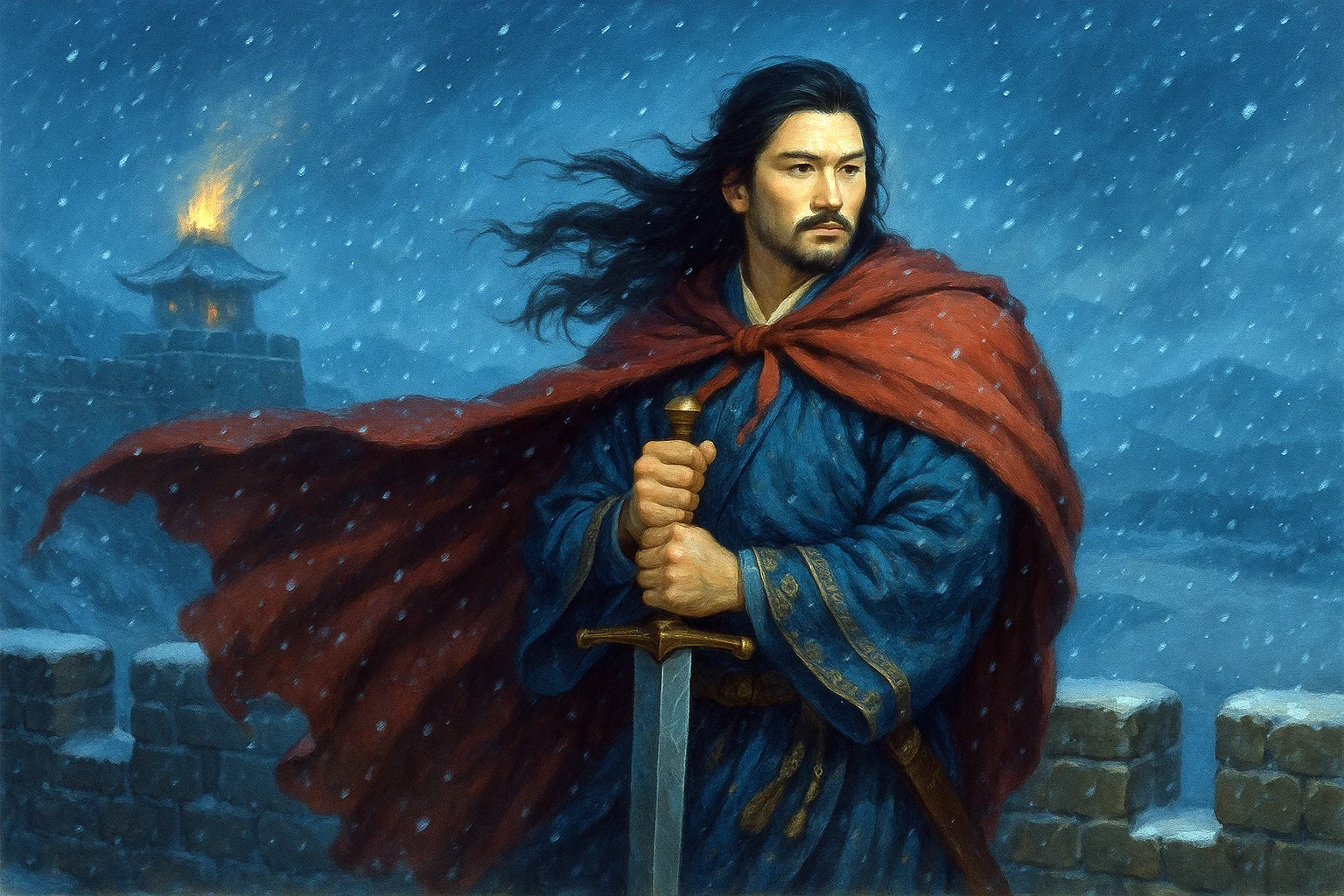
Cén Cān(岑参), 715 - 770 AD, was a native of Jingzhou, Hubei Province. He studied at Mt. Songshan when he was young, and later traveled to Beijing, Luoyang and Shuohe. Cén Cān was famous for his border poems, in which he wrote about the border scenery and the life of generals in a majestic and unrestrained manner, and together with Gao Shi, he was an outstanding representative of the border poetry school of the Sheng Tang Dynasty.






